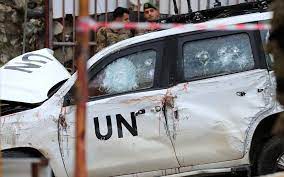Numerous investigations are now under way into what exactly happened in Lebanon which could have led to the tragedy on Wednesday night which left one Irish soldier dead and another critically injured.
The United Nations Interim Force in Lebanon or UNIFIL, the Lebanese authorities led by a military prosecutor and a multidisciplinary team from the Irish Defence Forces are all now involved in trying to piece together the timeline of events.
The country’s caretaker Prime Minister Najib Makati today promised that those responsible for this attack will be brought to justice, but there is already an acknowledgement that this will be a complex investigation.
Nicholas Blanford is a Beirut based consultant with US think tank the Atlantic Council.
He visited the scene of the attack yesterday and says it appears a two vehicle convoy of armoured utility vehicles was heading north to Beirut from the UNIFIL area of operations in southern Lebanon.
For “an as yet unknown reason they appear to have turned off the highway they were on”, travelling instead via the old coastal highway, after which locals report the vehicles on a road between the towns of Sarafand and Al Aqabiyeh, he says.
This may have raised the suspicions of some in the area and after some form of altercation shots were fired and the convoy crashed.
Key to establishing what happened will be a debrief of the other soldiers in the convoy, two of whom sustained less serious injuries.
There are many questions to be answered but Mr Blanford said there was a wariness among locals to speak about what happened when he visited the area after the tragedy.
“The elephant in the room here…is the Hezbollah organisation,” he says, pointing to the power and influence of the political organisation in Lebanon.

Southern Lebanon is a stronghold for Hezbollah, a powerful Iranian backed armed group and heavyweight political party.
It has denied any role in the attack, instead calling it an “unintentional incident” between residents and UN forces.
But the Irish Government says it will not be taking the Hezbollah comments at face value, insisting that only a full investigation can get to the truth.
Finding that truth may yet depend a great deal on the response of Hezbollah though.
Dr Edward Burke, a lecturer in the History of War at University College Dublin told RTÉ’s Six One News that while all the right sounds are coming from Lebanese government officials, there are states within states in Lebanon and the “most important actor here in terms of getting to the truth will be Hezbollah…..and what evidence and co-operation, if any, does Hezbollah provide over the coming days”.
It has often in the past, Dr Burke says, been a struggle for UNIFIL to get any assistance or collaboration from Hezbollah in such matters and the wariness displayed by the Irish Government about Hezbollah’s insistence that it was not involved in the incident is warranted.
All of this is playing out against the complex political issues in Lebanon and the wider region, Dr Burke says, as he points to the weakened state of Lebanese society following years of political and economic turmoil which has left it without any permanent government.
As investigations into the incident continue, Mr Blanford says it is unlikely that there will be any major change to the UNIFIL operation in Lebanon, as he says this does appear to have been “a one off incident” rather than the start of a broad, sustained attack against UNIFIL forces.
It seems, he says to have been “a tragic misunderstanding, a mistake with deadly consequences” the cause of which will be thoroughly examined by authorities, but which is unlikely to change daily operational activity by UNIFIL.
RTE


Leave a Reply
You must be logged in to post a comment.